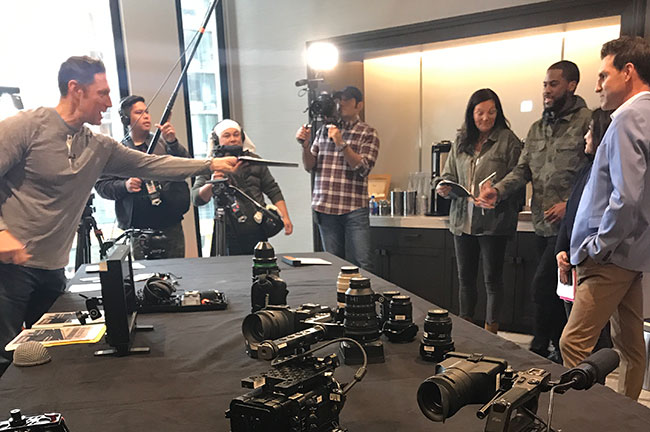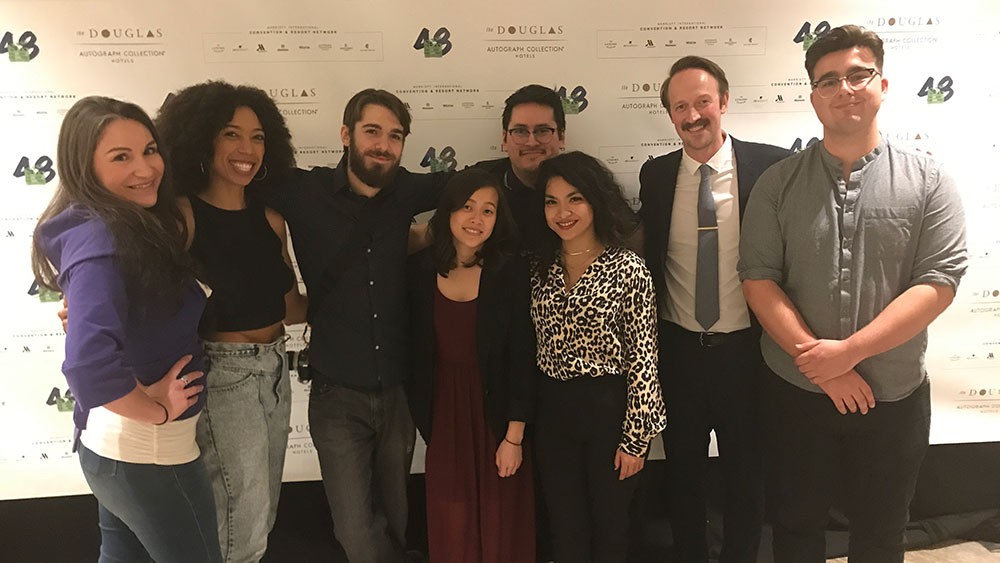They came. They saw. They conquered. And all in 48 hours.
Marriott’s CRN 48-Hour Film Challenge tasked four teams of five to write, cast, shoot and edit an eight- to 10-minute film shot entirely on location at Vancouver’s the Douglas, An Autograph Collection Hotel.
Meetings Today had exclusive media access to cover the proceedings from start to finish.
The rules were simple. The teams had to draw for random combinations of a meeting room that was re-imagined into an office, art gallery and boardroom setting, and a junior suite.
One team was confined to the hotel’s most-swanky suite for its primary location.
[Meetings Today Podcast: the DOUGLAS Goes to the Movies]
Other requirements were to use the line “this is great space”—in a nod to meeting planners—incorporate a bottle of maple syrup—in a nod to Canada—and make sure to mention Amy Ballard, DOSM at the dual-branded JW Marriott Parq Vancouver and the Douglas.
Contestants were also forced to use the equipment on hand, supplied by a local film equipment rental company and managed according to a strict competition budget. This forced the teams to make hard decisions on the level of gear they would use for different applications.
A lot can go wrong in a setting such as this, and a lot did.
But all of the teams came through with quality films, rising above any and all challenges.
A Marriott Convention & Resort Network (CRN) film crew was on hand to shoot footage for a reality program that will show off the flexibility and creativity of the hotel and CRN. And just like the competitors, the Marriott "team" also overcame several production challenges that threatened to gum up the works on more than one occasion.

Marriott CRN 48-Hour Film Challenge Contestants Pick Their Gear. Credit: Tyler Davidson
48-Hour Film Challenge: 5 Meeting Planner Takeaways
Here are five things that went wrong during Marriott's CRN 48-Hour Film Challenge, and five solutions that saved the day. Feel free to apply them to your meetings and events.
1. Air Travel Delays Can Throw a Wrench in the Works: The only film team based outside of Vancouver, coming from Los Angeles, faced an air travel delay when their plane had to turn around. Worse yet, one of the members didn’t have a passport, so he had to fly to Seattle, rent a car and then drive up to Vancouver. Knowing that a timely arrival can be critical for a competition with a 48-hour time limit, the Marriott CRN production team monitored the situation and juggled the schedule to accommodate the crew the best it could.
In the end, the Los Angeles team produced a high-quality film in less time than the others.
Lesson: Keep cool under pressure and let your team members adapt, adjust and shine.
2. Have Team Member Back-Ups Available—and Be Prepared to Pay: When one actor called in ill and another couldn’t commit to the full schedule, the casting director offered to dedicate her skills as an actress to fill in—and produced an acclaimed performance.
The Marriott CRN team threw a few more bucks at her for her extra time, knowing how important that role was in the success of the competition.
Lesson: Having utility players may cost, but it also pays.
3. Maintain a Positive Relationship With Your Suppliers: When one of the cameras was too high-performance for the technical capabilities/familiarity of the teams, the Marriott CRN production team’s relationship with the suppler, Vancouver’s Fusion Cine, paid off when the supplier rushed back to his office to swap out the camera with one the teams were more comfortable with.
Lesson: Having a positive relationship with your supplier could be the difference between success and failure when you need to call in a last-minute favor.
4. Make Sure Your Story Connects With Your Audience: Filmmakers and event planners both use their skills to tell a story, whether it’s a movie or the arc of a multi-day meeting. When one team in the 48-Hour Film Challenge conveyed a complex story in their entry, one of the judges reminded them to always make sure they continually reinforce the message to the audience.
Lesson: While the story creator may be intimately familiar with the story line, they must realize that their audiences may not be, and they often need to be guided along the path.
5. K.I.S.S.—Keep It Simple, Stupid!: The winners of the 48-Hour Film Challenge, team Cinema Role, won entry to the competition via a simple two-minute reel using animated stick figures to tell a basic story. Although simple, this conveyed the message to the producers of the 48-Hour Film Challenge that they could tell an emotional story in the most basic of terms.
Lesson: Don’t be afraid to strip your message down to a level that can be understood universally. Your audience will relate to your message on a much more personal, intimate basis.
To learn more about Marriot’s CRN 48-Hour Film Challenge, check out our “Marriott CRN and the 48-Hour Film Challenge” episode of the Meetings Today Podcast, recorded in Vancouver.







